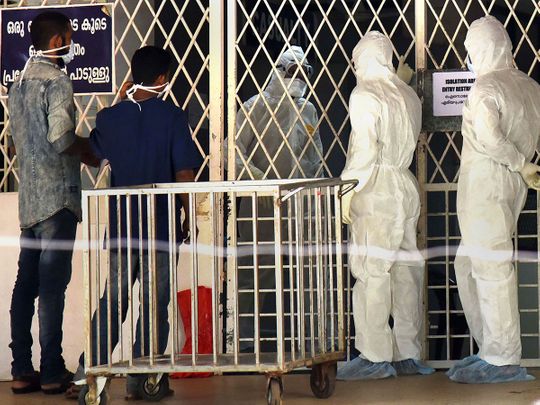
Thiruvananthapuram: After a 12-year-old boy succumbed to Nipah virus attack on Sunday, two health workers who were in contact with the boy are now under surveillance.
State health minister Veena George, who reached Kozhikode in the morning along with state PWD minister P.A. Mohammed Riyaz and state Transport minister A.K. Saseendran held a meeting of the health, revenue and police officials to review the situation.
The review meeting mainly revolved around the steps to be taken to manage the situation arising after the death of the 12 year-old boy and the return of Nipah after it was contained in the state on June 10, 2018.
■ In infected people, it causes a range of illnesses from asymptomatic infection to acute respiratory illness and fatal encephalitis.
■ Although Nipah virus has caused only a few known outbreaks in Asia, it infects a wide range of animals and causes severe disease and death in people, making it a public health concern.
■ Human infections range from asymptomatic infection to acute respiratory infection (mild, severe), and fatal encephalitis.
■ Infected people initially develop symptoms including fever, headaches, myalgia (muscle pain), vomiting and sore throat.
■ This can be followed by dizziness, drowsiness, altered consciousness, and neurological signs that indicate acute encephalitis.
■ Some people can also experience atypical pneumonia and severe respiratory problems, including acute respiratory distress.
■ Encephalitis and seizures occur in severe cases, progressing to coma within 24 to 48 hours.
■ The incubation period is believed to range from 4 to 14 days.
■ However, an incubation period as long as 45 days has been reported.
- World Health Organisation
In the last Nipah attack in 2018, 17 people had lost their lives and the government and health department are now not taking any chances.
According to the health department officials, two health officials, who were on the contact list of the boy, have developed symptoms of the virus. A total of 188 people are in the contact list and 20 of these are from the index list or high-risk category.
State Health Minister Veena George told media persons that one of the health workers is from the Kozhikode Government Medical College hospital and the other is from the private hospital where the boy was treated earlier.
'Stay alert'
The Health Minister while speaking to the media persons after the review meeting at the Kozhikode government guest house said, “There is no reason to worry but have to be highly alert. A ward at the Kozhikode Government Medical College has already been converted to Nipah ward and a control room is opened.”
She said that the three-storied pay ward at the Kozhikode Government Medical College will be allotted for Nipah and high-risk patients and the health workers will be soon shifted in that facility. The minister also said that a team from National Institute of Virology (NIV), Pune will reach Kozhikode soon and set up a virology lab at Kozhikode Government Medical College hospital. This lab is for initial screening for Nipah virus.
The minister also said that medical teams are visiting Chathamangalam panchayat to find out the contact source of the disease. She said that all necessary precautions were taken by Saturday evening itself before the test result of the child was announced.
Meanwhile the authorities have declared a high alert in Kozhikode district. The roads within 3 km of the residence of the deceased boy were cordoned off with a heavy police posse being deployed for duty.
The health department has already closed Ward no 9 of Chathamangalam panchayath and restrictions imposed in wards 8, 10, and 12.
The staff of the local hospital at Omassery in Kozhikode district where the child was first taken for consultation after he developed fever are also put under alert.
Health authorities have already informed the local people to immediately report any instances of fever, vomiting and other health ailments.








